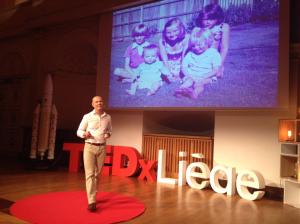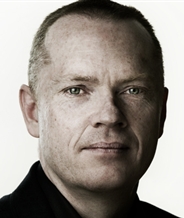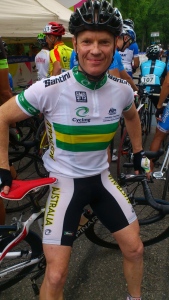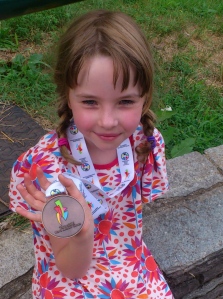Below is the narrative of my TEDx Talk in Liege on 21 May 2015.
Imagine if you worked for half of your life to be become a success, to really become someone.
You have this bold ambition to reach the moon.
But then when you become that person, you realize that it’s not who you want to be at all.
What would you do then?
I was born in a small country town called Shepparton about 200kms north of Melbourne in the South East of Australia. I was the 2nd youngest of seven children.
It was not always easy to make ends meet, and all of my older brothers and sisters left school to go to work by the time they were 15. It was a necessity, not a choice.
But as a kid, and despite the hardships, I had a big dream.
I dreamed of racing in Europe as a professional cyclist.
I started racing a bike on the BMX track when I was just nine years old, and by the time I was 16 I had progressed to the velodrome and racing on the road.
In 1987, the year that this photo was in the local newspaper I was one of the top riders in the State and on my way to the national championships with my friend and training partner Stuart McKenzie. That’s me on the left.
Cycling was my life, and I worked incredibly hard to reach my European dream. But at the same time, something had started to happen.
I was not just good at cycling; I was also doing very well at school.
I had dreamed of being a professional road cyclist since I was nine years old, but despite having enough talent to make it to the national level I had increasing doubts.
It was not that any one person told me that I should abandon my ambitions, and my parents were incredibly supportive.
But the influence of my environment – school career advisors, teachers and friends slowly but surely created anxiety and fear.
I was told that cycling was a nice hobby, but that I would struggle to make a living from it. That the chances of really making it to the top as a professional athlete were small.
I don’t think that people offered this ‘wisdom’ because they wanted to hurt me or to stop me being happy. Quite the opposite – they wanted me to follow a life that lead to stability and prosperity, and with that prosperity they thought would come happiness.
The message was that a cycling career was a dream, and that I should be more realistic especially since I was clever academically. Dreams are risky, and dreams might not pay the bills.
These pressures were only compounded when I did very well in my end of School exams, and was offered a grant to study at the University of Melbourne.
You see, where I come from only a handful of kids had gone on to tertiary education. And now I had this incredible opportunity – this chance to get an education.
But I knew that studying a degree full-time, as well as doing the part-time work I would have to do to make it through, would never allow me the time to compete at a high level.
In the end, the choice to pursue an academic path was my own but it was not my most desired path.
I am not sure if you can understand what I am saying – I felt that it was almost inevitable that I should stop cycling, even though it was a heart-breaking choice.
A few weeks before my 18th birthday I moved to Melbourne, and I let go of my European dream.
What I did do for the next 20 years was work incredibly hard. I brought that spirit of discipline and hard work to my studies, and I was very competitive.
I really wanted to make my family proud. But there was also something else – as a kid from a working class background I really resented many of the people around me at university.
The ones who had been born into privilege. The ones who I thought had it easy. I wanted to be better than them.
I didn’t really have career role models when I was growing up, so I looked around. And the wealthiest, most respected and well travelled professors that I saw were the Business School Professors.
So I decided I would become a Business School Professor, and not just any Business School Professor but one of the world’s best.
After my undergraduate degree, I went on to another graduate scholarship and by the time I was 29 years old I was working in London at one of the world’s leading graduate management schools.
And I kept working hard and getting promoted. At the age of 39 I was a professor, I had published in some of the world’s top management journals, and in addition I had started my own consulting business. I was earning more money than I ever imagined could be possible, and I was travelling the world.
But something was missing. You see, when I left Shepparton back in 1988 I had this belief that if I worked hard, and if I had success, then I would be happy. But I was far from happy.
And this is what I looked like. Yes, I was “successful” in a professional sense, and I know that many people envied what I had achieved. But I was tired, I was arrogant, I was unhealthy and I had this inner unhappiness.
I was now a husband and a father, and yet my obsession with work meant that I was not particularly good at being either.
I was working long hours, I was travelling constantly and I was obsessed with being the best.
I remember reading bed time stories to my three children at this time, and skipping parts of the story so I could get back to work. And of course, the kids had heard those stories countless times, so they knew!
The only problem was that I really didn’t’ know who I wanted to be.
And of course, I also realized it was no longer about me. It was about us. What did we want to become as a family?
There is a quote from the Chinese philosopher Lao Tzu “If you do not change direction, you may end up where you are heading.”
In 2009 my wife Anne-Mie and I spent many hours talking together, and these discussion culminated in a drawing exercise. We sat together with a large sheet of paper and co-created a hand drawn picture of what success really meant to us.
The pencil and ink sketches that we created revealed a much wider definition of success – we aspired to have a loving relationship and to live in a semi-urban environment in which our three children could play and be free.
We desired more family leisure time, and the opportunity to actively participate in the children’s social, artistic and sporting activities.
We both wanted to work, but to engage in professional activities that we enjoyed and which still provided the opportunity for occasional international travel.
And of course, in the bottom right of our picture was a hand drawn bicycle. I dreamed of returning to elite-level competitive cycling because that fire, that love for cycling had never left me.
I set a big and ambitious goal – to race at the next World masters Games in Torino in 2013. The World Masters Games organization is an amazing thing – its basically an Olympics for old people, and just like the real thing is held every four years.
The only problem of course was that this picture did not fit with my career, and a few days later I resigned my job at that prestigious business school to become a husband, father, writer, speaker and, of course, a cyclist.
Taking that leap involved confronting a lot of fears – but Anne-Mie and I decided to try and find our way.
On the 8th of August 2013, I stood on that start line of the mens road race at the World Masters Games in Torino with 160 of the world’s best Masters cyclists.
I had been preparing for this moment for four years, and in the process I had become a different person.
But of course it was not about who I had become. It was about what we had become.
With me in Torino were my three beautiful children and my wonderful wife Anne-Mie. Just before being marshaled onto the start line my little girl Hannah came up to me and said something I will never forget. She said “Pappa, its okay if you don’t win.”
And it was true, because I realized at that moment that being in Torino was about something much more than winning a bike race. It was about the journey.
It was about having the courage to create a new life and to define success in our own way.
It had not been easy, and their had been heartache and setbacks along the way. I had crashed in races and broken bones, there had been the two years when my income had been almost nothing as I learned new skills and connected to new people towards become a writer and a speaker.
But by 2013 almost everything that Anne-Mie and I had drawn in that picture four years before had fallen into place.
And the race was nine laps of an eight km circuit through Park Valentino and the streets of Turin, It was nine laps of pain as we averaged more than 40km per hour, and every single lap I was cheered on by Anne-Mie and the kids.
And I can’t tell you how this felt, to be living this childhood dream. A dream that I thought I had left behind.
Every lap we went over Mt Cappucini.. That little mountain had a 1km climb with up to 18% gradient. And each and every lap there were twenty fewer guys, until there were only about fifteen of us left. Fifteen of the best Masters cyclists in the world.
And at that moment, something crazy started to go through my mind – I could win!
But in the end I didn’t win, That was an incredible Czech cyclist. And an Italian came 2nd. But I did come home with a bronze medal.
So my message for you is this. It’s great to strive for success, to shoot for the moon. But there are many moons out there in the Universe, so please make sure that the moon you are shooting for is your own.
Thank you!




No comments:
Post a Comment